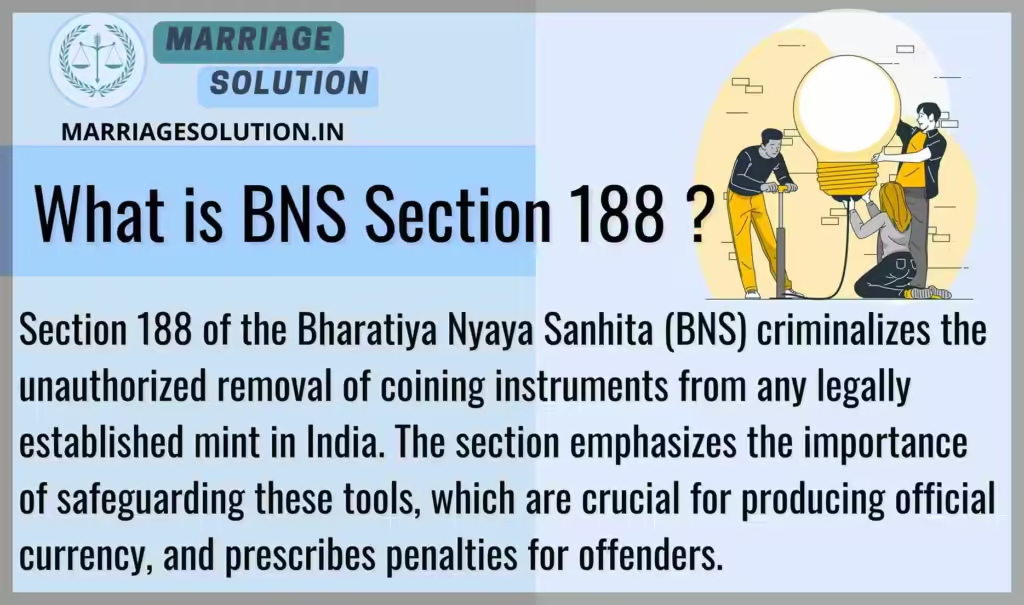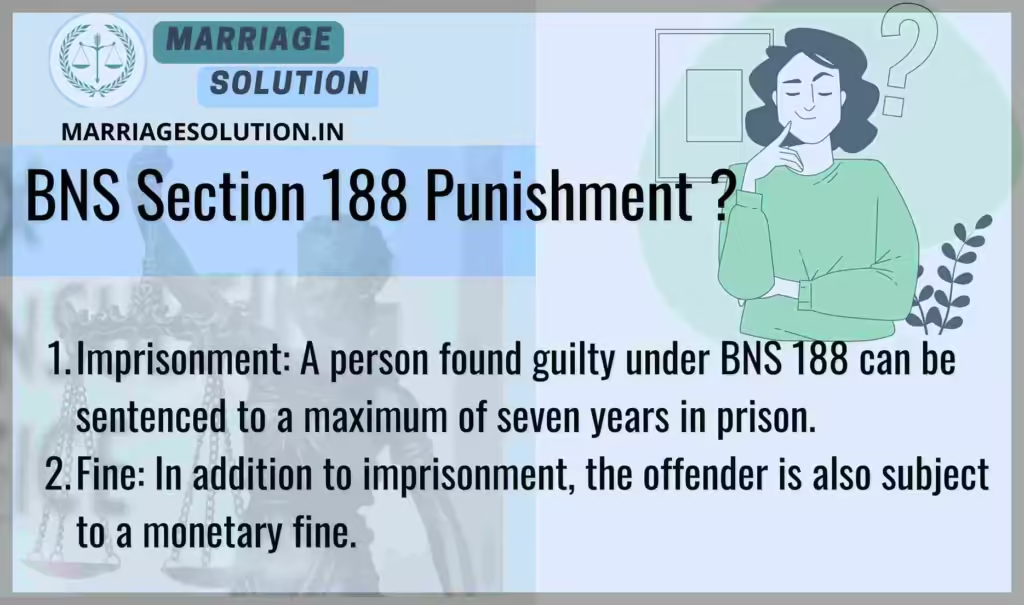Introduction of BNS 188
BNS 188 of the Bharatiya Nyaya Sanhita, 2023, deals with the unlawful removal of coining instruments from a mint. A mint is an official government establishment where coins are manufactured. This section ensures that mint employees or anyone with access cannot take away or misuse coin-making tools. Since such acts can lead to counterfeiting and threaten the financial security of the nation, the law imposes strict penalties, including imprisonment of up to seven years and fines.
The Bharatiya Nyaya Sanhita (BNS) Section 188 replaces the old Indian Penal Code (IPC) Section 245.
What is BNS Section 188 ?
Section 188 of the Bharatiya Nyaya Sanhita (BNS) criminalizes the unauthorized removal of coining instruments from any legally established mint in India. The section emphasizes the importance of safeguarding these tools, which are crucial for producing official currency, and prescribes penalties for offenders.

Under Section 188 of the bns act 2023
“Whoever, being employed in a mint lawfully established in India, takes or removes without lawful authority any coining instrument from the mint, shall be punished with imprisonment which may extend to seven years, and shall also be liable to fine.”
1. Meaning of “Unlawfully Taking Coining Instrument”
- A mint is a government facility where official coins are produced.
- A coining instrument refers to the machines, dies, presses, or tools used to make coins.
- If a person employed in a mint takes away such an instrument without lawful authority or permission, it is considered a crime.
- The act is not treated as simple theft but as a serious offense against the financial security of the nation.
2. Who is Covered?
This section applies to:
- Employees of a mint – Any worker officially employed in a government mint.
- Officials with access – Supervisors, operators, or technicians who handle coin-making equipment.
- Other persons – Contractors or anyone unlawfully gaining access to mint equipment.
3. Nature of the Offense
- Cognizable → Police can arrest without a warrant.
- Non-bailable → Bail is not a right; it depends on the discretion of the court.
- Non-compoundable → The offense cannot be settled privately and must be tried in court.
- Triable by Magistrate of the First Class → Heard by a competent judicial authority.
4. Examples of BNS Section 188
Example 1 – Unauthorized Removal by Mint Worker
A mint worker secretly removes a die used for coining ₹10 coins and sells it to outsiders. He is guilty under Section 188 and faces up to 7 years imprisonment and fine.
Example 2 – Attempt to Use for Counterfeiting
A contractor managing maintenance of machines in a mint steals a part of the coining press intending to supply it to counterfeiters. Even if the coins are not produced, the act of removal itself is punishable under this section.
Example 3 – Not Guilty Case
If a mint worker lawfully carries a coining tool outside with written permission from higher authorities (for repair or official transfer), it does not amount to an offense.
5. Punishment under BNS Section 188
- Imprisonment → Up to 7 years.
- Fine → Court may impose a fine in addition to imprisonment.
- Both → In serious cases, both penalties can be applied.
6. Importance of BNS Section 188
- Safeguards Currency Production → Prevents misuse of official coin-making tools.
- Prevents Counterfeiting → Stops illegal minting before it begins.
- Protects Economic Security → Ensures only genuine coins are circulated in the economy.
- Accountability of Mint Employees → Places strict responsibility on workers with access to sensitive equipment.
Section 188 BNS Overview
BNS Section 188 defines the illegal act of taking coining instruments out of a mint without proper legal authority. These instruments are crucial for minting coins and currency. The law imposes both imprisonment and fines on individuals who commit this offense, with the goal of ensuring that the minting process remains secure and free from tampering.
BNS Section 188 Explained in Detail: 10 Key Points
- What is BNS Section 188?
- BNS Section 188 deals with the unlawful act of removing coining tools or instruments from any mint that is lawfully established in India. It aims to protect the minting process, which is crucial for producing legal currency for the country. Any unauthorized removal of these tools is treated as a serious criminal offense.
- Purpose of BNS Section 188
- The primary goal of this law is to safeguard the integrity of currency production. Coining tools are essential for creating coins and other forms of currency. Unauthorized removal or theft of these tools can lead to illegal minting, counterfeit currency, or other financial frauds that could destabilize the economy.
- Who is Subject to this Law?
- This section applies to anyone who unlawfully removes minting tools from an official mint in India. These could be employees of the mint, contractors, or any other individual who gains unauthorized access to the mint’s equipment.
- Imprisonment under Section 188
- If found guilty of unlawfully taking coining instruments, a person can face imprisonment. The law allows for a maximum sentence of up to seven years. This severe punishment reflects the seriousness of tampering with tools essential for national currency production.
- Fine in Addition to Imprisonment
- Besides imprisonment, the offender can also be subjected to a monetary fine. The exact amount of the fine is not specified but will be determined based on the severity of the offense and other factors by the court.
- Why is This Offense Cognizable?
- A cognizable offense means that the police can arrest the person without needing a warrant. This is significant because it shows that the authorities view this offense as a serious crime that requires immediate action to prevent further damage or criminal activity.
- Non-Bailable Offense
- Since this offense is classified as non-bailable, the accused cannot automatically get bail. The court has the discretion to grant or deny bail, making it more difficult for the accused to be released while the trial is ongoing.
- Non-Compoundable Offense
- Non-compoundable means that the offense cannot be privately settled between the parties involved. Once the case is filed, it must go through the legal process, and only the court can decide the outcome. This ensures that offenses involving national currency production are dealt with in the public interest.
- Trial by Magistrate of the First Class
- Cases under Section 188 are tried by a Magistrate of the first class. This indicates that the case is serious but falls within the jurisdiction of a lower court that handles less severe criminal matters compared to sessions courts.
- Protection of National Security
- By criminalizing the unlawful removal of minting tools, BNS Section 188 indirectly protects the nation’s financial security. Unauthorized access to minting tools could lead to counterfeit currency production, which can severely impact national security and economic stability.
Examples of BNS Section 188
- Example 1:
A mint employee, without any authorization, removes a tool used for coining currency from the mint and sells it to a third party. The employee is caught by the authorities. Under BNS Section 188, they are charged with the unlawful removal of coining instruments and face up to seven years in prison and a fine. - Example 2:
A person posing as a worker at a mint enters the facility and attempts to steal a coining tool to produce counterfeit coins. The security apprehends the person, and they are charged under Section 188, leading to imprisonment and a heavy fine. The court considers the severity of the crime since it directly threatens the nation’s currency system.
BNS 188 Punishment
Imprisonment: A person found guilty under BNS 188 can be sentenced to a maximum of seven years in prison.
Fine: In addition to imprisonment, the offender is also subject to a monetary fine.

BNS 188 bailable or not ?
No, BNS Section 188 is non-bailable, meaning bail is not automatically granted, and the accused may have to remain in custody while awaiting trial.
Bharatiya Nyaya Sanhita Section 188
| Section | What it Means | Punishment | Bail | Cognizable? | Trial By |
|---|---|---|---|---|---|
| BNS Section 188 | Applies to mint employees who take or remove coining instruments from a government mint without lawful authority. | Imprisonment up to 7 years and fine. | Non-bailable | Cognizable (police can arrest without warrant) | Magistrate of the First Class |
| IPC Section 245 (Old) | Covered those who fraudulently removed, destroyed, or hid coining tools from a mint under the old Penal Code. | Imprisonment up to 7 years and fine (same as BNS 188). | Non-bailable | Cognizable | Magistrate of the First Class |
| Key Difference: BNS 188 simplifies and modernizes IPC 245 by clearly defining unlawful removal and emphasizing stronger protection for mint instruments. | |||||
BNS Section 188 FAQs
What does BNS Section 188 prohibit?
It prohibits the unlawful removal of coining tools or instruments from any legally established mint in India.
What is the maximum punishment under Section 188?
The maximum punishment is up to seven years of imprisonment, along with a fine.
Who can be tried under this section?
Anyone found unlawfully taking minting tools without permission can be tried under this section.
What type of court handles cases under Section 188?
Cases under this section are tried by a Magistrate of the first class.
What is the classification of the offense under Section 188?
It is a cognizable, non-bailable, and non-compoundable offense.
Conclusion
BNS Section 188 is a crucial safeguard against the unlawful removal of minting instruments. By prescribing up to seven years of imprisonment and fines, it ensures accountability among mint employees and others who may access coining tools. This law directly protects the integrity of India’s currency system by preventing tools from being misused for counterfeiting. While similar to IPC Section 245, the updated provision in BNS strengthens India’s legal framework by clearly defining the offense and maintaining strict penalties.
Need Legal Support?
If you’re facing court proceedings, marriage-related issues, or any legal matter, our team at Marriage Solution – Lawyer Help is ready to guide you. Just complete our easy online enquiry form, and we’ll connect you with the right legal assistance tailored to your needs.
Finished with BNS 188 ? Continue exploring the next provisions of the Bharatiya Nyaya Sanhita (BNS), 2023. Each section includes explanations, examples, and plain-language breakdowns for easy understanding.
- 189 BNS : Unlawful assembly.
- https://marriagesolution.in/bns_section/189-bns/
- 190 BNS : Every member of unlawful assembly guilty of offence committed in prosecution of common object.
- https://marriagesolution.in/bns_section/190-bns/
- 191 BNS : Rioting.
- https://marriagesolution.in/bns_section/191-bns/
- 192 BNS : Wantonly giving provocation with intent to cause riot- if rioting be committed; if not committed.
- https://marriagesolution.in/bns_section/192-bns/
- BNS 193 : Liability of owner, occupier etc., of land on which an unlawful assembly or riot takes place.
- https://marriagesolution.in/bns_section/bns-193/
Full IPC Section List: https://marriagesolution.in/ipc-section-list
All Indian Law & Blogs: https://marriagesolution.in/indian-law/
Full BNSS Section List: https://marriagesolution.in/bnss_section-list
